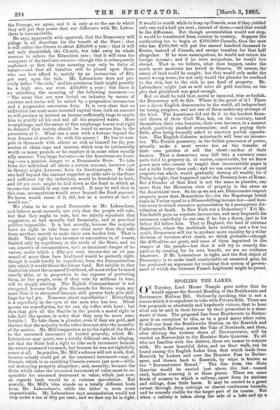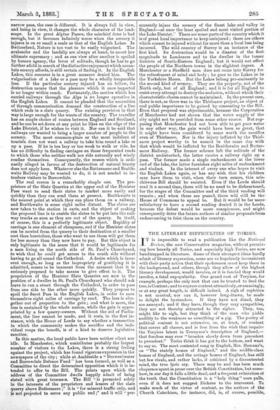SPOILING THE LAKES.
(AN Tuesday, Lord Mount Temple gave notice that he kJ would oppose the Second Reading of the Braithwaite and Buttermere Railway Bill. Ordinarily speaking, this is not a course which it is expedient to take with Private Bills. There are few proposals so absolutely and hopelessly vicious, that to hear what can be said in their favoar by their promoters is a sheer waste of time. The proposed line from Braithwaite to Butter- mere is an exception to this, as to a good many other rules. It will run from the Braithwaite Station, on the Keswick and Cockermonth Railway, across the Vale of Newlands, and then, after skirting the western shore of Derwentwater, will be carried up Borrowdale to the Honister Slate Quarries. To all who are familiar with the district, these are names to conjure with. No more beautiful drive, and no finer walk, can be found among the English Lakes than that which leads from Keswick by Lodore and over the Honister Pass to Butter- mere, and thence back to Keswick, by what is known as the " Derwentwater Round." The line from the Slate Quarries would be carried just above the last - named road, besides crossing it at three places. There are some kinds of scenery to which a railway, apart from its stations and sidings, does little harm. It may be carried to a great extent through deep cuttings or almost continuous tunnels, and be scarcely visible for the larger part of its course. But when a railway is taken along the side of a lake and up a narrow pass, the case is different. It is always full in view, and being in view, it changes the whole character of the land- scape. In the great Alpine Passes, the mischief done is bad enough, but it becomes infinitely worse when the scenery it injures is on so small a scale as that of the English Lakes. In Switzerland, Nature is too vast to be easily vulgarised. The avalanche and the landslip are always at hand, to assert her ultimate supremacy ; and as one view after another is spoiled by human agency, the lover of solitude, though he has to go further afield in search of the distinctive enjoyment which moun- tain scenery affords, is still certain of finding it. In the English Lakes, this resource is in a great measure denied him. The vulgarisation of a lake or a pass may be a wholly irreparable loss. If the particular scenery injured has no fellow, its destruction means that the pleasure which it once imparted is no longer within reach. Fortunately, the motive which has carried railways through the Alps is no longer operative in the English Teikes. It cannot be pleaded that the necessities of through communication demand the construction of a line which ends in a slate quarry. The existing provision in that way is large enough for the wants of the country. The traveller has an ample choice of routes between England and Scotland, and he can be set down at any point he likes on the edge of the Lake District, if he wishes to visit it. Nor can it be said that railways are wanted to bring a larger number of people to the scenery. The most common-place or the most indolent, of tourists does not want a railway to take him round a lake or up a pass. If he is too lazy or too weak to walk or ride, he has no difficulty in finding carriages on those frequented roads to which those who neither walk nor ride naturally and wisely confine themselves. Consequently, the reason which is ordi- narily alleged in favour of the destruction of natural beauty does not apply here. Whatever else the Buttermere and Braith- waite Railway may be wanted to do, it is not needed to in- troduce visitors to Borrowdale.
The real reason is a remarkably simple one. The pro- prietors of the Slate Quarries at the upper end of the Honister Pass want to send their slates to market more easily and quickly than they can send them at present. Braithwaite is the nearest point at which they can place them on a railway, and Braithwaite is some eight miles distant. The slates are now taken to the station in carts, and the object of making the proposed line is to enable the slates to be put into the rail- way trucks as soon as they are out of the quarry. In itself, of course, this is a perfectly legitimate object. Rapidity of carriage is one element of cheapness, and if the Honister slates can be carried from the quarry to their destination at a smaller cost than heretofore, those who want to use them will get them for less money than they now have to pay. But this object is only legitimate in the sense that it would be legitimate for a man living on the north side of St. Paul's Churchyard, to wish that he could get across to the south side without having to go all round the Cathedral. A desire which is inno- cent enough, so long as the impropriety of gratifying it is admitted, ceases to be innocent from the moment that it is seriously proposed to take means to give effect to it. The proprietors of the Honister Slate Quarries are now in the position of a dweller in St. Paul's Churchyard who should ask leave to run a street through the Cathedral, in order to pass from one side to the other more quickly. They propose to spoil the finest Pass in the English Lakes, in order to save themselves eight miles of carriage by road. The loss is alto- gether out of proportion to the gain ; and what is more, the loss is sustained by the whole nation, while the gain is appro- priated by a few quarry-owners. Without the aid of Parlia- ment, the line cannot be made, and it rests, in the first in- stance, with the House of Lords to say whether a transaction in which the community makes the sacrifice and the indi- vidual reaps the benefit, is of a kind to deserve legislative sanction.
In this matter, the local public have been neither silent nor idle. In Manchester, which contributes probably the largest number of visitors to the Lakes, there is a strong feeling against the project, which has found vigorous expression in the newspapers of the city ; while at Ambleside a " Der went water and Borrowdale Defence Fund" has been formed, as well as a Committee to direct the determined opposition which it is in- tended to offer to the Bill. The points upon which the address of the Committee dwells happily admit of being stated with great terseness. The Bill " is promoted solely in the interests of the proprietors and lessees of the elate quarry above Buttermere ;" it is "for mineral traffic only, and is not projected to serve any public end ;" and it will " per- manently injure the scenery of the finest lake and valley in England—at once the least spoiled and most visited portion of the Lake District." There are some parts of the country which it is of great local importance to keep uninjured ; there are others which.cannot be injured without far more than a local loss being incurred. The wild country of Surrey is an instance of the first kind. Its destruction would be a disaster of the first magnitude to Londoners and to the dweller in the tamer districts of South-Eastern England ; but it would not affect the people of the Northern towns in the slightest degree. A Manchester or a Sheffield man does not come into Surrey for the refreshment of mind and body ; he goes to the Lakes or to the Yorkshire Moors. But the Lakes belong pre-eminently to the second kind of scenery. They are the property, not of the North only, but of all England ; and it is for all England to- resist every attempt to destroy the seclusion, without which their characteristic charm cannot be maintained. In the present case, there is not, as there was in the Thirlmere project, an object of real public importance to be gained by consenting to the Bill. Even that proposal was objectionable, because the Corporation of Manchester had not shown that the water supply of the city might not be provided from some other source. But sup- posing that Manchester had not been able to get pure water in any other way, the gain would have been so great, that it might have been considered by some worth the sacrifice even of Thirlmere. Nor is the injury inflicted by the Thirl- mere project worthy to be named in the same day with that which would be inflicted by the Braithwaite and Butter- mere Railway. The former scheme left the solitude of the' district undisturbed, the latter carries a railway right up a pass. The former made a single embankment at the lower' end of the lake, the latter furnishes eight miles of embankment and viaduct. In the interest of every one who hopes to visit the English Lakes again, or has any.wish that his children may have them to visit, when their tarn comes, this mis- chievous Bill should be resisted. Even if the Lords should read it a second time, there will be no need to be disheartened, for the stages of the Committee and of the third reading will remain ; and when these are passed, there will still be the. House of Commons to appeal to. But it would be far more, satisfactory to have a second reading denied it in the Lords, because the defeat would be more conspicuous, and might. consequently deter the future.authors of similar proposals from
endeavouring to foist them on the country. •



































 Previous page
Previous page